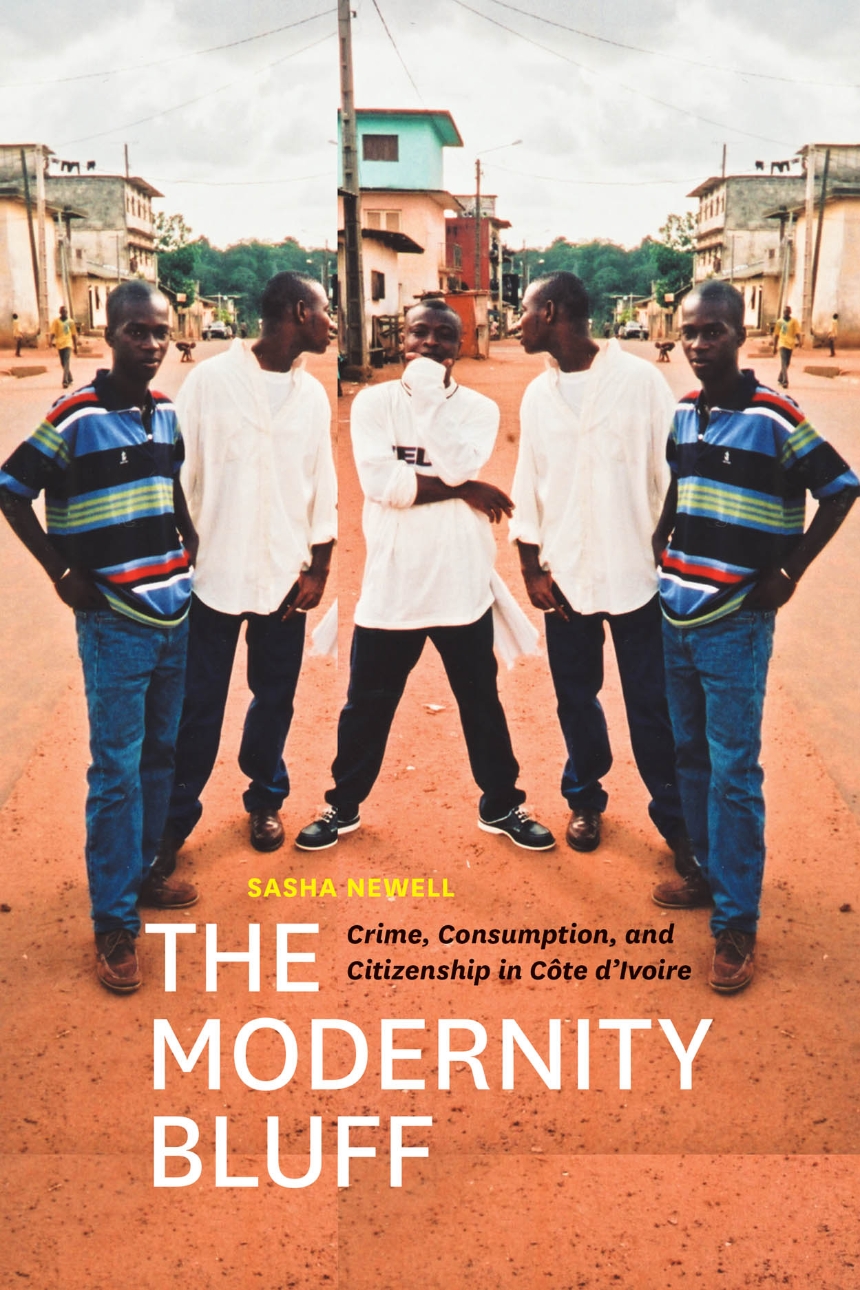The Modernity Bluff
Crime, Consumption, and Citizenship in Côte d’Ivoire
The Modernity Bluff
Crime, Consumption, and Citizenship in Côte d’Ivoire
In Côte d’Ivoire, appearing modern is so important for success that many young men deplete their already meager resources to project an illusion of wealth in a fantastic display of Western imitation, spending far more than they can afford on brand name clothing, accessories, technology, and a robust nightlife. Such imitation, however, is not primarily meant to deceive—rather, as Sasha Newell argues in The Modernity Bluff, it is an explicit performance so valued in Côte d’Ivoire it has become a matter of national pride.
Called bluffeurs, these young urban men operate in a system of cultural economy where reputation is essential for financial success. That reputation is measured by familiarity with and access to the fashionable and expensive, which leads to a paradoxical state of affairs in which the wasting of wealth is essential to its accumulation. Using the consumption of Western goods to express their cultural mastery over Western taste, Newell argues, bluffeurs engage a global hierarchy that is profoundly modern, one that values performance over authenticity—highlighting the counterfeit nature of modernity itself.
Reviews
Table of Contents
INTRODUCTION
Ivoirian Nationalism and Urban Popular Culture
Yere and Gaou: Authenticity and the Cosmology of Modernity
Sapeurs and Bluffeurs: Discourses on African Mimesis
Mimesis and Masking: Real Fakes and the Elusive Illusion of Modernity
Abidjan: The Urban Setting
Methodology
Outline of the Argument
ONE / Enregistering Modernity, Bluffing Criminality: How Nouchi Speech Reinvented the Nation
Les Nouchis—Speaking of “Gangsters”
Loubard, Boss, and Bakroman: Further Stereotypes
Yere and Gaou: Nouchi Hierarchy and Modernity
Ivoirian Language Policy and the French Model of National Identity
Urban Cultural Integration and the Ivoirianization of French
The Emergence of Nouchi and the Self-Recognition of Ivoirian Popular Culture
Vicarious Banditry: The Mediation of Nouchi
Purity and the Perils of Degeneration: Anxious Interpretations of Nouchi
Nouchi and National Identity
TWO / Bizness and “Blood Brothers”: The Moral Economy of Crime
The Infamy of Treichville
The Economic Underpinnings of the Bluff: Illicit yet Moral Economies
The Illegitimacy of Labor
Kinship, Economy, and Gendered Sociality
Bizness
The Productivity of Social Networks
The Normative Network
State Intervention/State Cooperation
Hierarchical Relations
Social Accumulation
THREE / Faire le show: Maquis Masculinity and the Performative Success of Waste
The Maquis: Public Space Par Excellence
Imbibing Differentiation: Drinking Establishments and Disdain
“Gâte, on est ensemble”: The Trope of Waste
“Go Waste It, We are Watching”: Dance and Display
The Gift of Bluffing: Exchanges Underlying the “Show”
Out on “La Rue”
The Dangers of Display
Street Rituals: Urban Life Cycle Ceremonies and the Maquis
Potlatch and the Production of Audience
Masculinity and the Dangerous Consumption of Women
Gender and the Performativity of the Bluff
FOUR / Fashioning Alterity: Masking, Metonymy, and Otherworld Origins
The Centrality of the Sartorial
The Bluff: Appearance and Economy
Elite Consumption: Following the French
Yere Consumers and Urban Symbols of Modernity
Suits versus Hip-Hop: Taste and Social Hierarchy
Whiteness and the Otherworld: A Local Cosmology of Externality
Evaluating Objects: The Modernity of Brands
Authentic Imitations, Metonymic Transformations
Ivoirian Masquerades and Yere Vision
FIVE / Paris Is Hard like a Rock: Migration and the Spatial Hierarchy of Global Relations
Urban-Village Migration
Migrating Dreams
Migratory Practicalities
The Descent and the Bluff
Bengiste Networks, Migrant Economies
Demystification and Remythologizing Discourses
The Mediation of the Otherworld: Migration as a Form of Consumption
Migration and National Identity
SIX / Counterfeit Belongings: Branding the Ivoirian Political Crisis
Ethnicity, Postcoloniality, and National Identity
Ivoirian Models of Nationality: French versus Nouchi
The Death of Houphouët and the Emergence of Ivoirité
Boubous and the Politics of Exclusion
The Structure of the North-South Divide in Popular Culture
Branding the Nation: Cultural Mastery and the Unstable Signification of Authenticity
CONCLUSION / Modernity as Bluff
On the Nature of “Western” Imitation
On the Character of (Alternative?) Modernity
Postcolonial Mimesis and the Crisis of Signification
Incommensurability: Fetishes, Doubles, and the Fake
Notes
Glossary
References
Index
Awards
Royal Anthropological Institute: Amaury Talbot Prize
Won
African Studies Association: Melville J. Herskovits Award
Finalist
